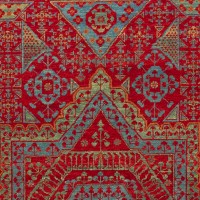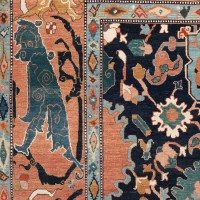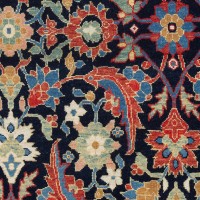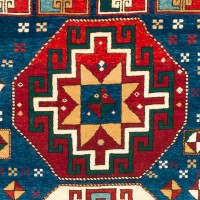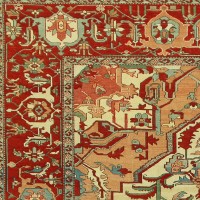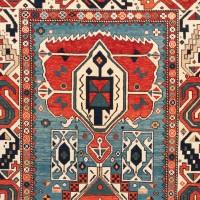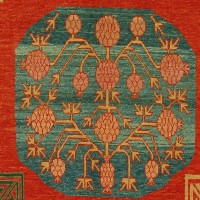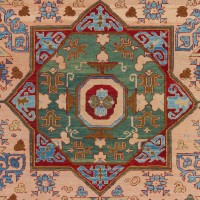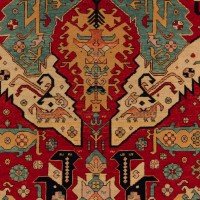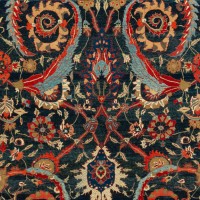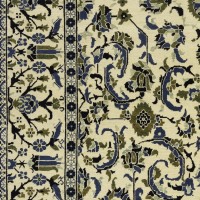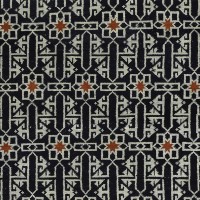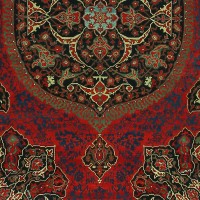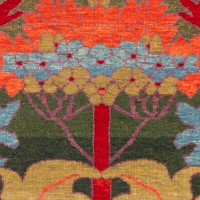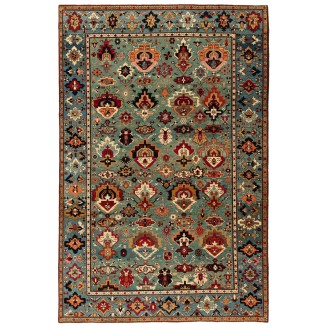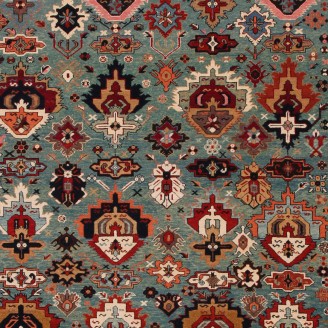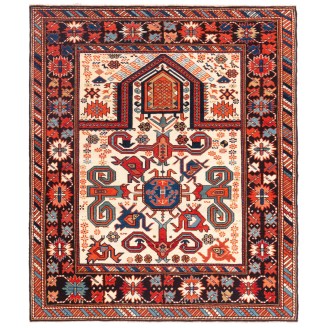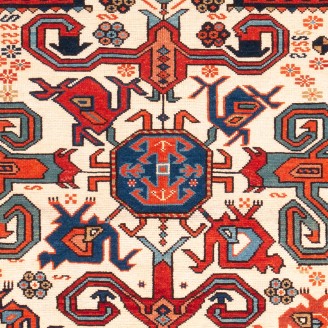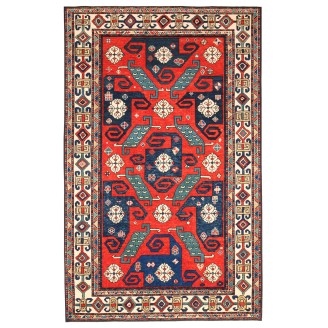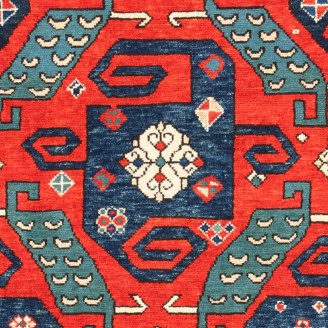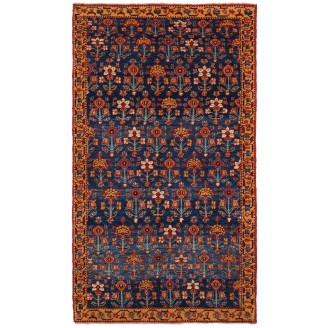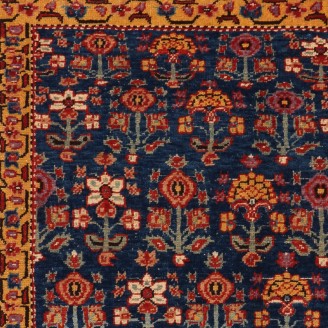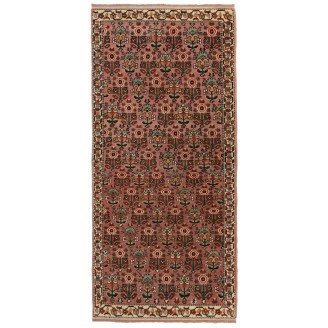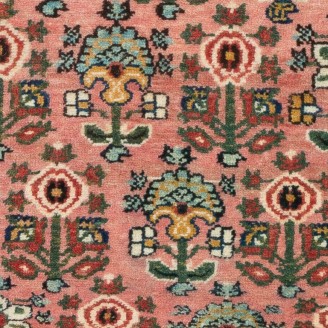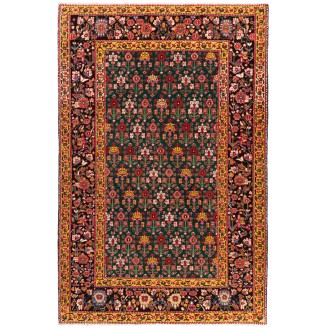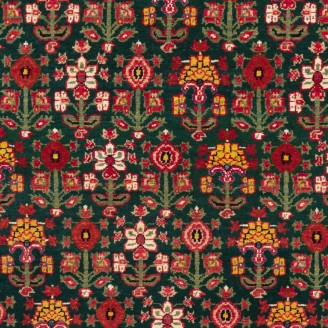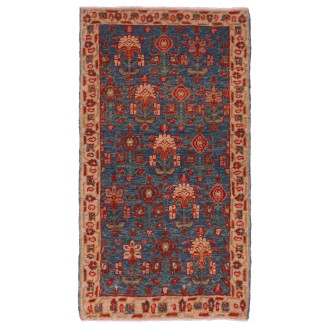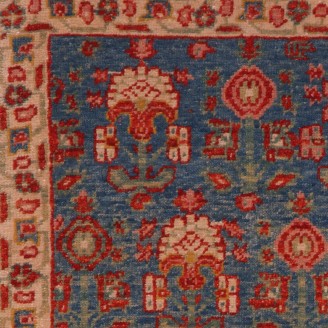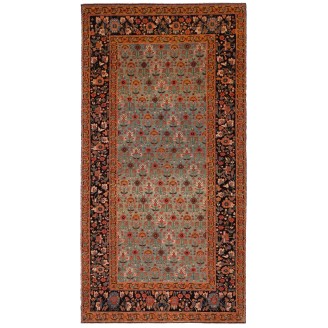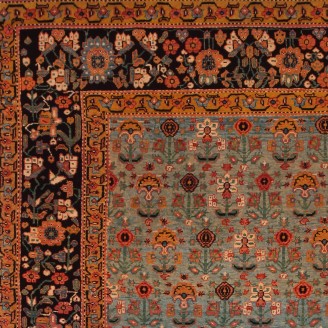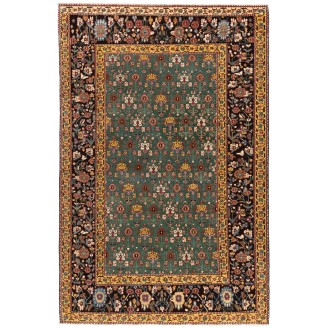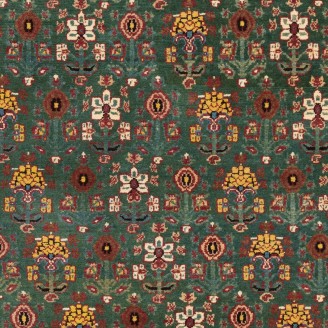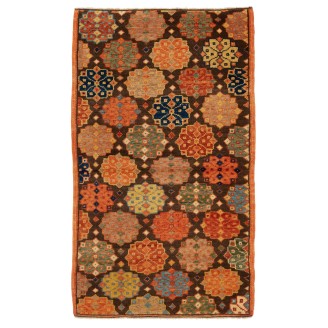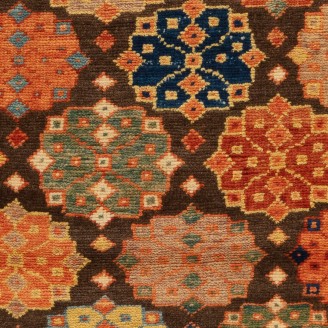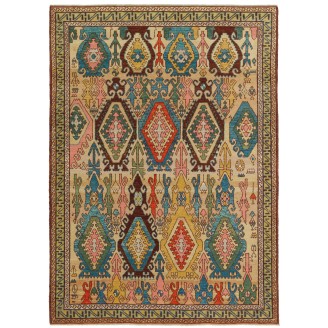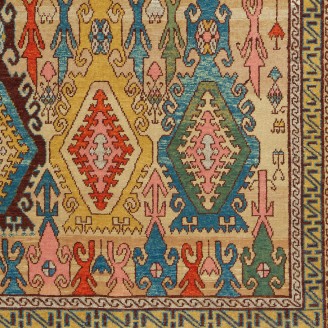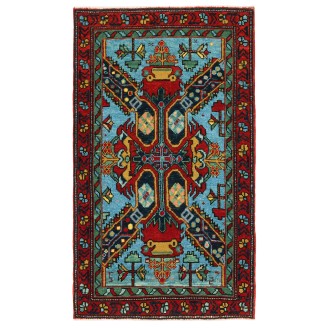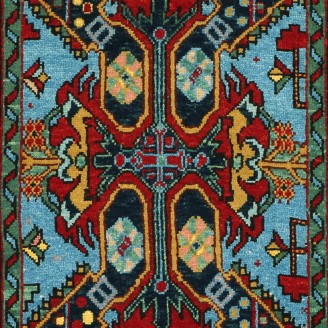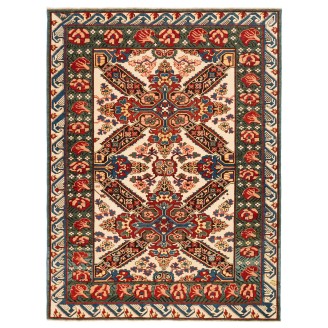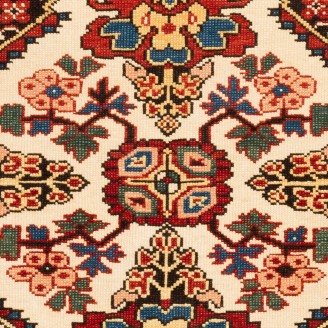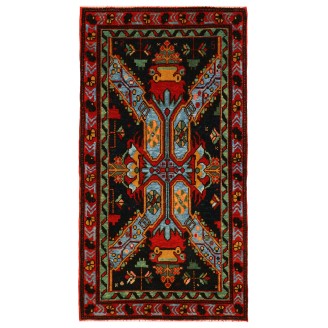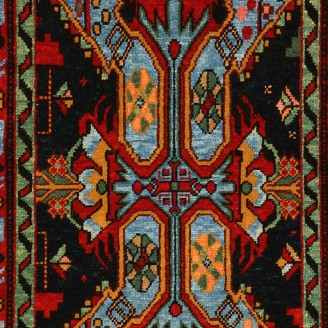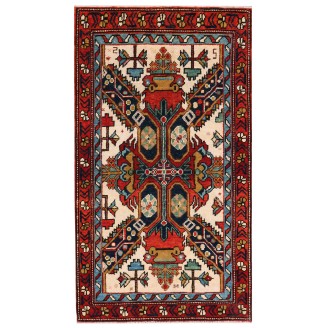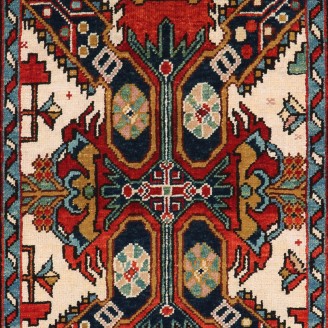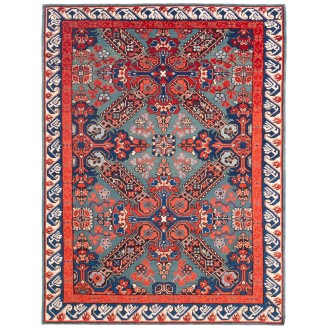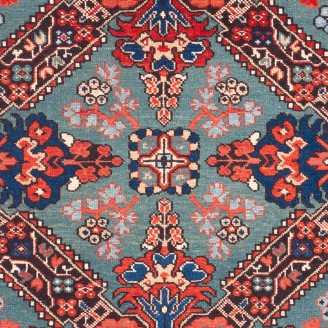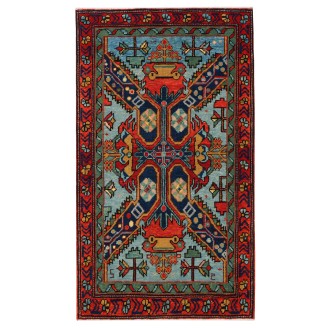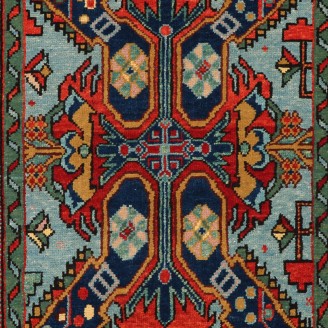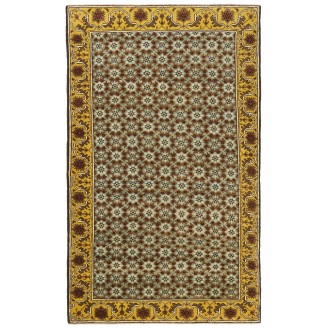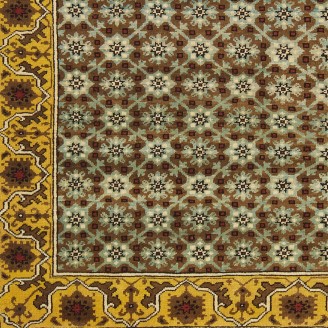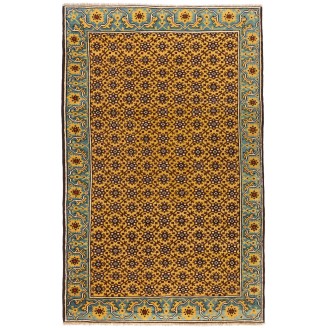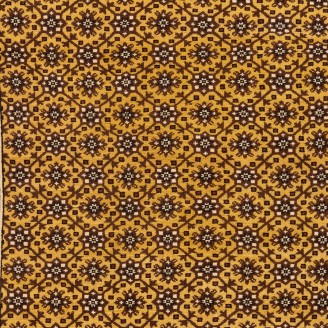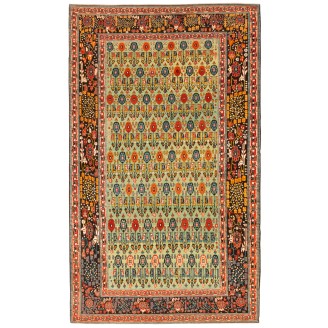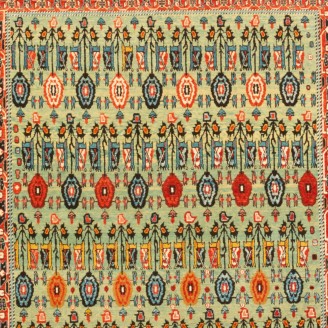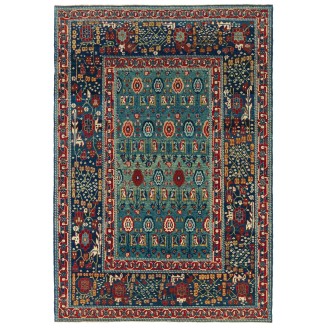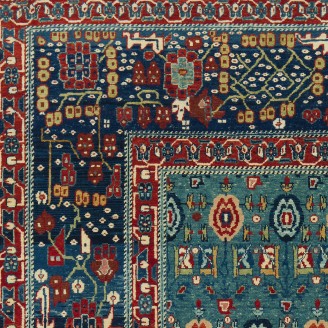Model: ART00362
Dimensions: 6'0" X 8'11"(183cm x 272cm)
The source of the rug comes from the book Orient Star - A Carpet Collection, E. Heinrich Kirchheim, Hali Publications Ltd, 1993 nr.75. This offset pattern is composed of ascending shield-like palmettes flanked by leaf-like wings designed for 17th to 18th-century rugs from Azerbaijan, the North-west ..
Price:
$9,200
Ex Tax:$9,200
Model: ART00031
Dimensions: 3'8" X 4'3"(112cm x 130cm)
The source of the rug comes from the book Tapis du Caucase - Rugs of the Caucasus, Ian Bennett & Aziz Bassoul, The Nicholas Sursock Museum, Beirut, Lebanon 2003, nr.60 and Oriental Rugs Volume 1 Caucasian, Ian Bennett, Oriental Textile Press, Aberdeen 1993, pg.280 and Caucasian Carpets, E. Gans-Reud..
Price:
$3,520
Ex Tax:$3,520
Model: ART00055
Dimensions: 4'9" X 7'6"(147cm x 231cm)
The source of the rug comes from the book Islamic Carpets, Joseph V. McMullan, Near Eastern Art Research Center Inc., New York 1965 nr.53 and Tapis du Caucase - Rugs of the Caucasus, Ian Bennett & Aziz Bassoul, The Nicholas Sursock Museum, Beirut, Lebanon 2003, nr.3. This was a late example of one o..
Price:
$0
Ex Tax:$0
Model: ART00296
Dimensions: 2'7" X 4'7"(81cm x 140cm)
The source of the rug comes from the book Antique Rugs of Kurdistan A Historical Legacy of Woven Art, James D. Burns, 2002 nr.36 This was an exclusive example of offset rows of ascending flowers design rug c.1800s from Garrus, Eastern Kurdistan area. This type of rug has been called "Joshagan" in th..
Price:
$1,800
Ex Tax:$1,800
Model: ART00425
Dimensions: 2'8" X 5'8"(83cm x 175cm)
The source of the rug comes from the book Antique Rugs of Kurdistan A Historical Legacy of Woven Art, James D. Burns, 2002 nr.36 This was an exclusive example of offset rows of ascending flowers design rug c.1800s from Garrus, Eastern Kurdistan area. This type of rug has been called "Joshagan" in th..
Price:
$2,700
Ex Tax:$2,700
Model: ART00395
Dimensions: 4'5" X 6'7"(135cm x 203cm)
The source of the rug comes from the book Antique Rugs of Kurdistan A Historical Legacy of Woven Art, James D. Burns, 2002 nr.36 This was an exclusive example of offset rows of ascending flowers design rug c.1800s from Garrus, Eastern Kurdistan area. This type of rug has been called "Joshagan" in th..
Price:
$5,100
Ex Tax:$5,100
Model: ART00238
Dimensions: 1'10" X 3'3"(56cm x 101cm)
The source of the rug comes from the book Antique Rugs of Kurdistan A Historical Legacy of Woven Art, James D. Burns,2002 nr.36 This was an exclusive example of offset rows of ascending flowers design rug c.1800s from Garrus, Eastern Kurdistan area. This type of rug has been called "Joshagan" in the..
Price:
$825
Ex Tax:$825
Model: ART00341
Dimensions: 4'5" X 8'6"(135cm x 261cm)
The source of the rug comes from the book Antique Rugs of Kurdistan A Historical Legacy of Woven Art, James D. Burns,2002 nr.36 This was an exclusive example of offset rows of ascending flowers design rug c.1800s from Garrus, Eastern Kurdistan area. This type of rug has been called "Joshagan" in the..
Price:
$4,900
Ex Tax:$4,900
Model: ART00396
Dimensions: 4'5" X 6'8"(135cm x 204cm)
The source of the rug comes from the book Antique Rugs of Kurdistan A Historical Legacy of Woven Art, James D. Burns, 2002 nr.36 This was an exclusive example of offset rows of ascending flowers design rug c.1800s from Garrus, Eastern Kurdistan area. This type of rug has been called "Joshagan" in th..
Price:
$5,100
Ex Tax:$5,100
Model: ART00324
Dimensions: 2'3" X 3'10"(70cm x 119cm)
The source of the rug comes from the book Orient Star - A Carpet Collection, E. Heinrich Kirchheim, Hali Publications Ltd, 1993 nr.173. This classical shape of a rosette design 16th-century rug from the Aksaray region, Central Anatolia area, Turkey. The arrangement of rosettes and the color combinat..
Price:
$0
Ex Tax:$0
Model: ART00466
Dimensions: 5'1" X 7'1"(156cm x 216cm)
The source of the rug comes from the book Orient Star – A Carpet Collection, E. Heinrich Kirchheim, Hali Publications Ltd, 1993 nr.214. This is a series of medallions designed rug from the 17th century, Şarkışla (Sarkisla, Sharkishla or Sharkisla) region, Sivas, Central Anatolia area, Turkey. This r..
Price:
$3,700
Ex Tax:$3,700
Model: ART00081
Dimensions: 1'9" X 2'11"(54cm x 91cm)
The source of the rug comes from the book Tapis du Caucase - Rugs of the Caucasus, Ian Bennett & Aziz Bassoul, The Nicholas Sursock Museum, Beirut, Lebanon 2003, nr.90 and Oriental Rugs Volume 1 Caucasian, Ian Bennett, Oriental Textile Press, Aberdeen 1993, pg.376 and Caucasian Carpets, E. Gans-Reud..
Price:
$825
Ex Tax:$825
Model: ARTK0024
Dimensions: 4'0" X 5'4"(124cm x 163cm)
The source of the rug comes from the book Tapis du Caucase - Rugs of the Caucasus, Ian Bennett & Aziz Bassoul, The Nicholas Sursock Museum, Beirut, Lebanon 2003, nr.90 and Oriental Rugs Volume 1 Caucasian, Ian Bennett, Oriental Textile Press, Aberdeen 1993, pg.376 and Caucasian Carpets, E. Gans-Reud..
Price:
$0
Ex Tax:$0
Model: ART00082
Dimensions: 1'9" X 3'2"(54cm x 97cm)
The source of the rug comes from the book Tapis du Caucase - Rugs of the Caucasus, Ian Bennett & Aziz Bassoul, The Nicholas Sursock Museum, Beirut, Lebanon 2003, nr.90 and Oriental Rugs Volume 1 Caucasian, Ian Bennett, Oriental Textile Press, Aberdeen 1993, pg.376 and Caucasian Carpets, E. Gans-Reud..
Price:
$825
Ex Tax:$825
Model: ART00092
Dimensions: 1'9" X 3'1"(55cm x 95cm)
The source of the rug comes from the book Tapis du Caucase - Rugs of the Caucasus, Ian Bennett & Aziz Bassoul, The Nicholas Sursock Museum, Beirut, Lebanon 2003, nr.90 and Oriental Rugs Volume 1 Caucasian, Ian Bennett, Oriental Textile Press, Aberdeen 1993, pg.376 and Caucasian Carpets, E. Gans-Reud..
Price:
$0
Ex Tax:$0
Model: ART00034
Dimensions: 3'10" X 5'0"(118cm x 154cm)
The source of the rug comes from the book Tapis du Caucase - Rugs of the Caucasus, Ian Bennett & Aziz Bassoul, The Nicholas Sursock Museum, Beirut, Lebanon 2003, nr.90 and Oriental Rugs Volume 1 Caucasian, Ian Bennett, Oriental Textile Press, Aberdeen 1993, pg.376 and Caucasian Carpets, E. Gans-Reud..
Price:
$4,500
Ex Tax:$4,500
Model: ART00078
Dimensions: 1'9" X 3'1"(54cm x 96cm)
The source of the rug comes from the book Tapis du Caucase - Rugs of the Caucasus, Ian Bennett & Aziz Bassoul, The Nicholas Sursock Museum, Beirut, Lebanon 2003, nr.90 and Oriental Rugs Volume 1 Caucasian, Ian Bennett, Oriental Textile Press, Aberdeen 1993, pg.376 and Caucasian Carpets, E. Gans-Reud..
Price:
$0
Ex Tax:$0
Model: ART00335
Dimensions: 4'3" X 6'10"(130cm x 210cm)
This carpet has an interpreted design composed of a flower lattice pattern taken from a part of the Selcuk carpet, filling the field elegantly, has the impression that it is only part of a larger scheme designed 14th-century rug from the Selcuk, Anatolia era, Konya region, Turkey. The Seljuk period ..
Price:
$2,700
Ex Tax:$2,700
Model: ART00323
Dimensions: 4'5" X 6'10"(135cm x 210cm)
This carpet has an interpreted design composed of a flower lattice pattern taken from a part of the Selcuk carpet, filling the field elegantly, has the impression that it is only part of a larger scheme designed 14th-century rug from the Selcuk, Anatolia era, Konya region, Turkey. The Seljuk period ..
Price:
$3,400
Ex Tax:$3,400
Model: ART00311
Dimensions: 6'6" X 10'11"(200cm x 333cm)
The source of the rug comes from the book Antique Rugs of Kurdistan A Historical Legacy of Woven Art, James D. Burns, 2002 nr.28. This was an exclusive example of offset rows of flowers designed 18th-century rug from Senna, Eastern Kurdistan area. This example is special because the flowers are well..
Price:
$12,420
Ex Tax:$12,420
Model: ART00484
Dimensions: 4'10" X 7'1"(149cm x 217cm)
The source of the rug comes from the book Antique Rugs of Kurdistan A Historical Legacy of Woven Art, James D. Burns, 2002 nr.28. This was an exclusive example of offset rows of flowers designed for 18th-century rug from Senna, Eastern Kurdistan area. This example is special because the flowers are ..
Price:
$6,100
Ex Tax:$6,100
